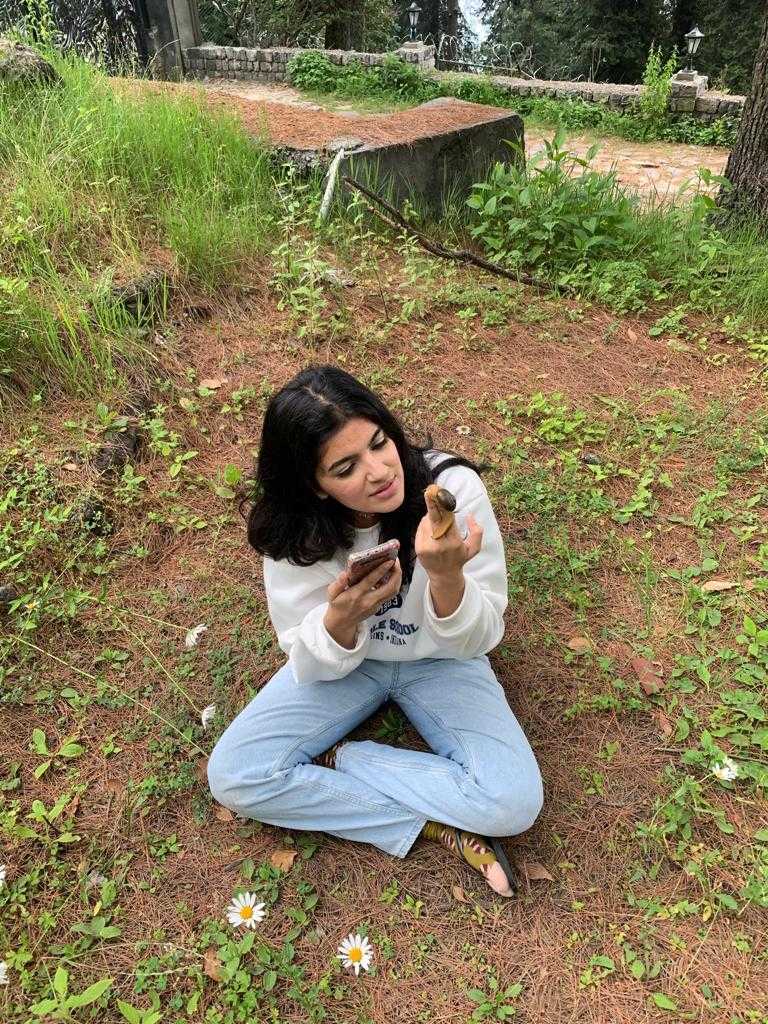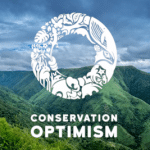Have you ever wondered how conservationists spend their days or what keeps them optimistic about the future of nature? Do they always spend their time in the distant wild, or might they be hidden all around us? Do their roles encompass aspects we never thought of?
“Meet The Optimists” is a monthly blog series by Conservation Optimism which introduces conservationists working in different fields and contexts to our readers. We discuss their journeys into conservation, typical daily activities and reasons for hope.
Read on for the inside story on different careers and fresh approaches to conservation!
In the July 2023 blog of Conservation Optimism’s “Meet The Optimists” series, Maria Hashmi shares her experience as a conservationist working in Pakistan, her work imparting nature and climate education to children, and how it is to be a part of a family nature reserve!
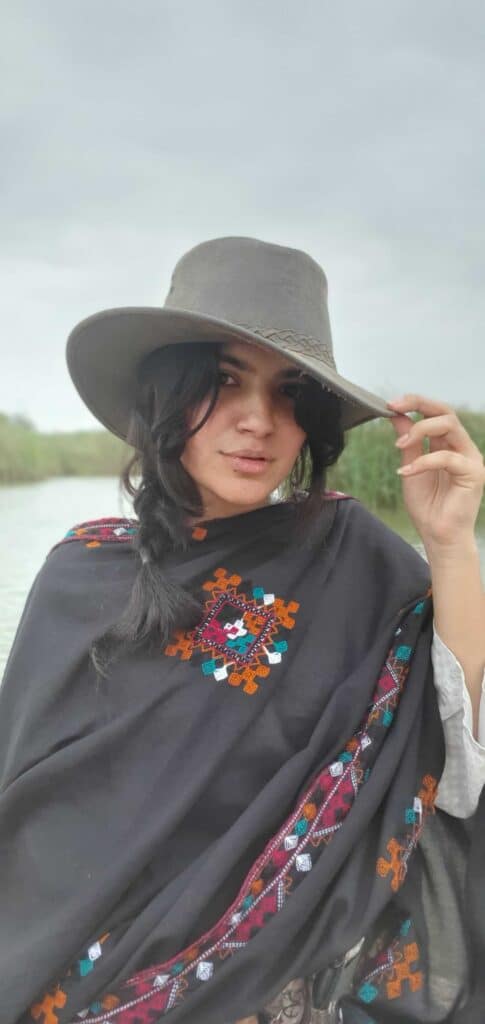
Maria Hashmi
“My name is Maria Hashmi, and I am a conservationist living in Islamabad, Pakistan. I am 22 years old and never pursued a higher education; I graduated high school at the peak of COVID-19, so my only option was to jump right into the workspace. As a child, I grew up in a farmhouse in the suburbs, so I was always surrounded by wildlife. My dad is a conservationist, so concepts around wildlife and conservation were common in the house when I was growing up. Currently, I’m running a nature camp for kids! I founded Little Rebels Nature Camp back in October 2022. Our camp caters to kids under 13 and offers YUNGA-certified challenge badge courses – it is the first of its kind in Pakistan! Our camp is 100% outdoors, so when it’s too hot for our courses, I travel to the south of Pakistan to work with my dad on our family reserve. My dad bought this agricultural land in 2011, and we have been rewilding it ever since. We have already successfully rewilded 100 acres of land where native species now thrive.”
Can you trace the origins of your interest in conservation and what led to your current work?
The origins of my interest and passion are definitely deeply rooted in growing up away from the city. I had so many positive interactions with wildlife as a child, and living alongside nature was something that came very easily to me. I am certain that if I had grown up in the city like most friends, I would not be the conservationist I am today. All those little moments, catching butterflies, searching for frogs, finding a pangolin in our backyard, were the perfect playing field for a young naturalist. Alongside my growing interest, my parents had a very non-restrictive style of parenting, so as a child catching frogs in the rain, I never felt like a weirdo or that I would be better suited doing other things, I was always freely able to explore and enjoy my interests. All my childhood experiences are actually the reason I founded Little Rebels Nature Camp.
When I got older, I realised that the only difference between me and the people around me was that they never had the chance to even explore the outdoors, owing to the lack of security in Pakistan. Meanwhile, I was able to explore to the fullest in the safety of my backyard. Recognising my privilege, I decided to open our farm to children lacking exposure to nature. I figured that parents would be more willing to let their children explore if it was from the safety of a private residence. I thought that if I could give kids the same experiences I had as a child that eventually led to me being a passionate conservationist, then maybe something might shift for them, too, perhaps a slight bit of interest. Children are naturally curious; they just need a safe space to explore and ask questions, someone to fan the flame of endless curiosities and wonderful questions. I thought that even if they don’t end up in a wildlife-centric field, even if they become lawmakers, lawyers, teachers, and business owners, they’ll still have a connection to nature that could influence their decisions and have a larger impact. Wouldn’t it be wonderful if all our lawmakers, lawyers, teachers, and business owners were conservationists too? I believe the world would be a much better place if we achieved that.
As for the reserve, it all goes back to a family trip to south africa – my dad and I were really inspired by all the wonderful conservation work being done by the reserves and decided we wanted the same for Pakistan too.
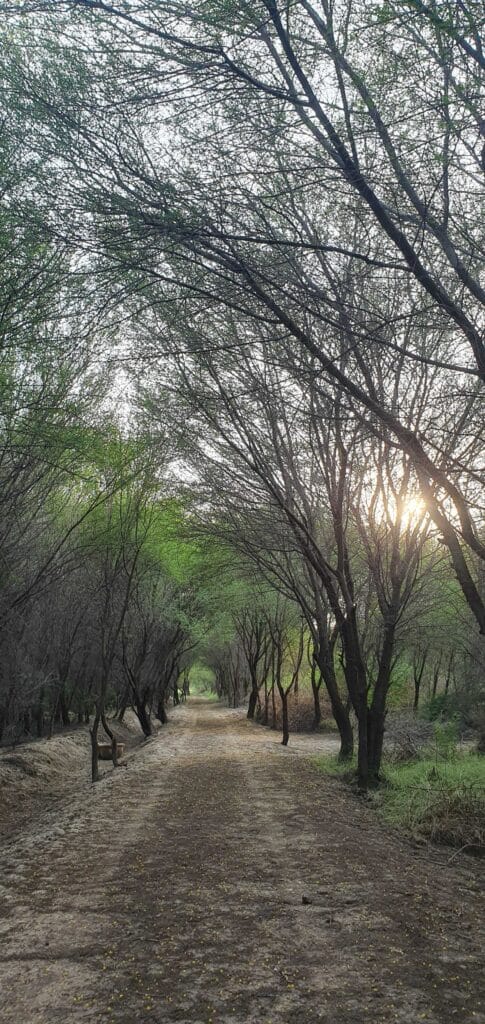
The Reserve in Sindh, Pakistan
What does a typical day of work look like for you?
I stay pretty busy almost all the time – either in Islamabad running the camp or in Sindh working at the reserve. I alternate between the two every month or so. At camp, which we run in the cooler months, our day starts early because we have to prep the whole day’s material in advance – once the day begins, we hardly have an hour between different sets of kids! Usually, we have 3 separate sessions a day, each running for 2 hours and the last session ending just before sunset. At the reserve, days start a bit later when the sun is a little less harsh. We spend hours in the jungle doing population surveys, cleaning up trails or hacking away at invasive plants. Because both my jobs are self-employed roles, it’s hard to have a steady routine, but I really enjoy just having things constantly changing and not having to settle into the monotony of a fixed schedule.
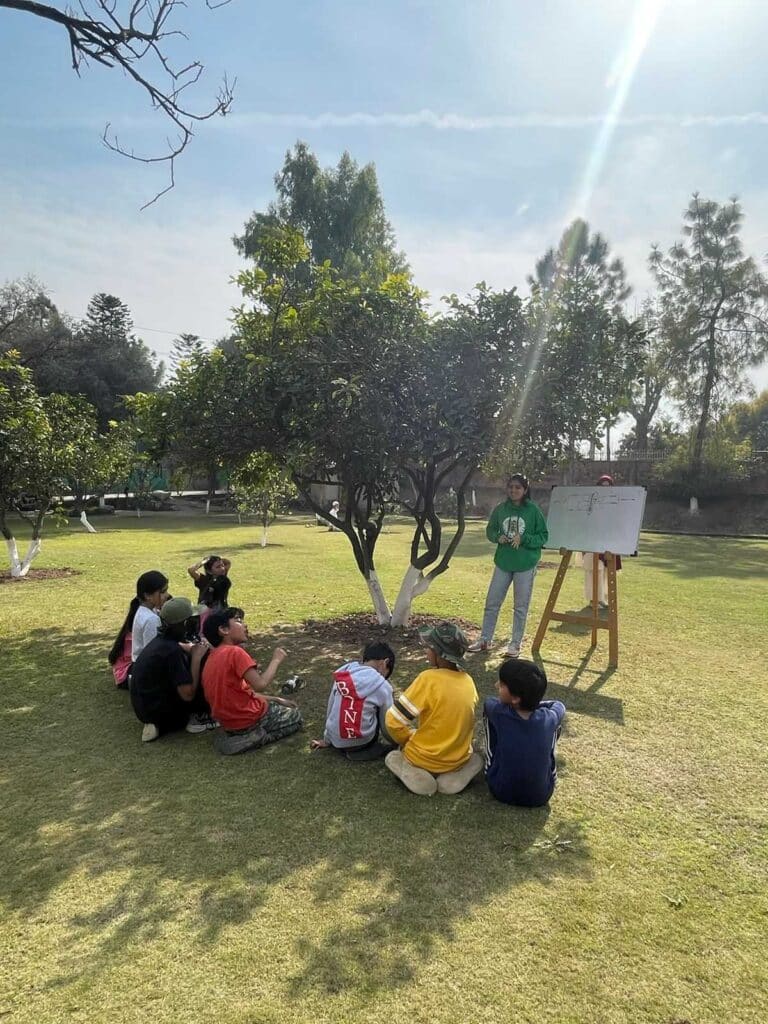
A Little Rebels nature camp in session
What is your favourite and least favourite aspect about your role?
My favourite thing about my role as a camp instructor is the pure joy in children’s eyes when they are given the space just to be themselves. I love that when their parents come to pick them up from camp, they’re begging for even just 10 more minutes. I love being able to ignite their curiosities successfully! My least favourite thing about this role is charging a fee for the courses! I know it sounds ridiculous because it’s totally unrealistic to run them for free, considering we provide all the material. Still, I keep thinking that my prices might make this knowledge inaccessible for some kids and thinking about that really makes me upset. Perhaps in the future, I can do some scholarships!
At the reserve, my favourite part is that there’s no service! It’s so great just being able to disconnect from everything and take a break from doom-scrolling! Being off the Internet forces you to be the truest version of yourself because you’re not being influenced by anything. I love having that freedom! My least favourite part about this role is that it’s physically taxing. After a few exciting days, spending hours in the jungle under the scorching sun eventually gets to you… sore muscles and insect stings begin to make me a bit homesick.
As a conservationist, what makes you hopeful about the future?
The children! For every cohort of Little Rebels, I get to meet brilliant young minds that I have no doubt will be the future of conservation. I see myself in their wild eyes. I see so much passion and innovation. At under 13, they already know so much and care so much about environmental issues. After camp is over, I often get parents asking me about pathways into conservation because their children have expressed interest in pursuing environmental education as a career. There is hope for as long as people care, as long as people look at nature and feel something. And I think that children going home from a nature camp having decided that they are going to be conservationists is actually what planet Earth needs!
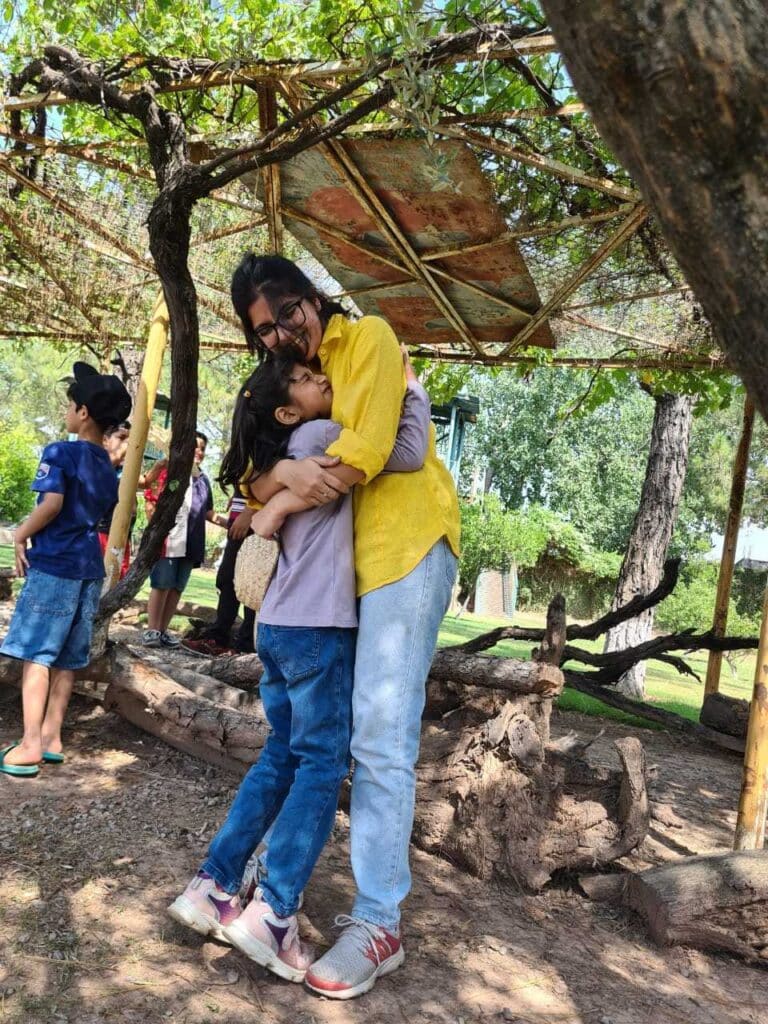
Little Rebels
What helps you stay positive day-to-day?
Just the vast beauty and sheer greatness of nature! I step outside and see such wonderful creatures that it fills me with a sense of joy and conviction. It’s really just stopping to smell the roses, spending a few minutes a day in the garden, noticing the little things. Sometimes I watch animals just doing normal animal things, and I realise how madly in love I am with the wild world and how I cannot imagine dedicating my life to anything else. So day to day, any wildlife I see is enough to remind me why I’m doing all this in the first place, and that makes me unbelievably happy. I stay positive because I remind myself that for every day that I’m alive, I can do something to save what I love most.
Could you share a story about a formative moment in your conservation career?
I think that everything changed for me when I started working at Conservation Optimism. Before I joined, I worked at our family reserve but had zero self-confidence. I was convinced that because I didn’t have a degree, I would never be able to work with any organisations and I’d be looked down upon forever. I had just accepted that all I could ever do were self-employed roles. At first, I started helping Pakistan Hub with their social media, and then the hub manager forwarded me a post about positions at conservation optimism that were open for applications. I was really sceptical just because I thought I was setting myself up for failure; it felt like a punch to the gut just looking at the poster. With next to nothing on my resume, I sent in my application. I was shocked that I was even shortlisted for an interview. To my surprise, the interview went great, and I was informed shortly after that I got the role. I can’t describe the feeling I got when I read the email – all my self-doubt washed away with a few words. I would mark this as perhaps the most important part of my conservation career because if it weren’t for Conservation Optimism, I never would’ve applied anywhere else; I never would have put myself out there from the fear and near certainty of failure. All the wonderful organisations I’ve worked with, people I’ve met, and things I’ve learnt because of Conservation Optimism really accelerated my career and boosted my self-worth. Conservation Optimism took a chance on a nervous 21-year-old with a horrible resume, and it changed my life.
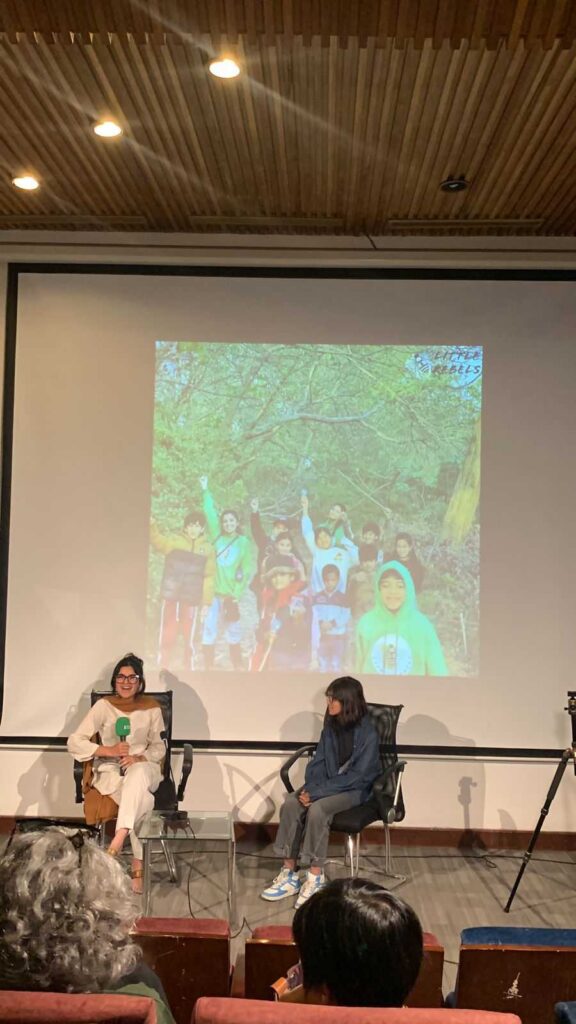
Maria talking about Little Rebels at Pakistan’s first wildlife film festival, Pakistan International Wildlife & Eco Film Festival.
Any advice for someone interested in pursuing your field of work?
My advice for someone interested in pursuing a career in conservation is to follow your dreams and your passion. If you have a genuine love for the environment, don’t hesitate to go for it. Remember that you can contribute to conservation even if you pursue careers that are not directly related to biology. There is a need for economists, sociologists, social psychologists, environmental lawyers, engineers, and individuals with various skills to provide solutions to our unsustainable way of living. Embrace interdisciplinary learning and gain practical experience through internships, volunteer work, or research projects.
Collaboration and building connections are key, as conservation is a collective effort involving various stakeholders. Be determined, adaptable, and open to learning. Pursuing a career in conservation can be both rewarding and challenging, but your passion and dedication can make a significant impact in building a more sustainable future.
Follow Maria’s work on her Instagram and Little Rebels!

